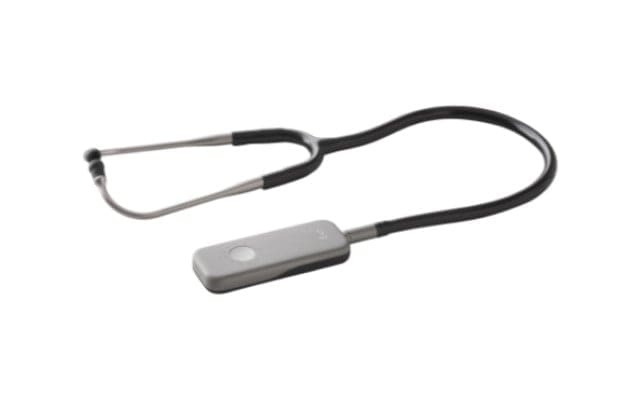Invented more than 200 years ago, the doctor’s stethoscope has long been an essential part of every medic’s toolkit for listening to sounds within the body. Now, the humble medical device is getting a hi-tech, AI upgrade.
A team of doctors in the UK has designed an AI-powered stethoscope that can detect heart conditions in patients within 15 seconds. It can be used to diagnose heart failure, heart valve disease, and abnormal heart rhythms in patients by analysing tiny differences in a patient’s heartbeat and blood flow that are undetectable to the human ear. It simultaneously takes a rapid Electrocardiogram (ECG).
The AI tool was developed by researchers at Imperial College London and Imperial College Healthcare NHS trust with partial funding from the British Heart Foundation and the National Institute for Health and Care Research (NIHR) in the UK. The researchers have presented further details about the AI-powered stethoscope at the European Society of Cardiology annual congress in Madrid.
 The AI-powered stethoscope has a rectangular shaped chest-piece. (Image: British Heart Foundation)
The AI-powered stethoscope has a rectangular shaped chest-piece. (Image: British Heart Foundation)
The device is considered a breakthrough in cardiology as it could enable early diagnosis, which is said to be vital for the treatment of the three heart conditions. It comes at a time when predictive AI-led tools are gaining momentum owing to the generative AI boom. However, AI medical devices also carry risks, as patients could be wrongfully diagnosed with health conditions due to information hallucination.
Researchers behind the AI-powered stethoscope have stressed that the device should be used only on patients who already show symptoms of suspected heart problems and not for routine health check-ups.
“The design of the stethoscope has been unchanged for 200 years – until now. So it is incredible that a smart stethoscope can be used for a 15-second examination, and then AI can quickly deliver a test result indicating whether someone has heart failure, atrial fibrillation, or heart valve disease,” Dr Patrik Bächtiger, of Imperial College London’s National Heart and Lung Institute and Imperial College healthcare NHS trust, was quoted as saying by The Guardian.
Dr Sonya Babu-Narayan, clinical director of the British Heart Foundation and consultant cardiologist, said: “We need innovations like these, providing early detection of heart failure, because so often this condition is only diagnosed at an advanced stage when patients attend hospital as an emergency. Given an earlier diagnosis, people can access the treatment they need to help them live well for longer.”
Story continues below this ad
How it works
While the underlying tech has been designed by UK doctors, the hardware device was reportedly manufactured by Eko Health, a California-based company. Unlike traditional stethoscopes, the chestpiece is rectangular in shape and attached to the earbuds.
When placed on a patient’s chest, the stethoscope takes an ECG recording of the electrical signals from the heart while an in-built microphone records the sound of blood flowing through the heart.
The data is sent to the cloud, where it is processed and analysed by AI algorithms specifically trained to detect subtle heart problems that a human doctor may miss. The results of the analysis are sent back and can be accessed via smartphone.

